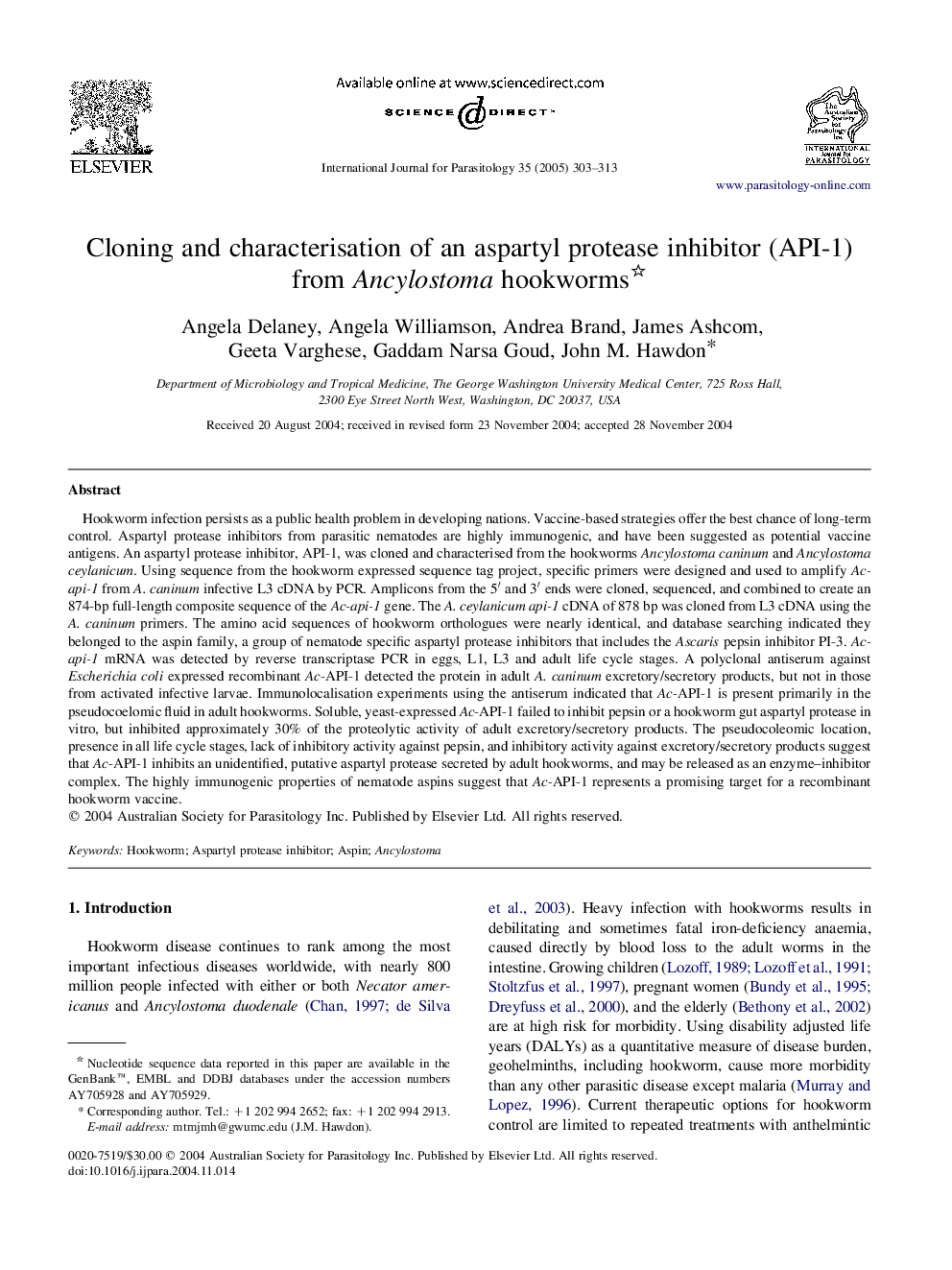| کد مقاله | کد نشریه | سال انتشار | مقاله انگلیسی | نسخه تمام متن |
|---|---|---|---|---|
| 8979957 | 1107382 | 2005 | 11 صفحه PDF | دانلود رایگان |
عنوان انگلیسی مقاله ISI
Cloning and characterisation of an aspartyl protease inhibitor (API-1) from Ancylostoma hookworms
دانلود مقاله + سفارش ترجمه
دانلود مقاله ISI انگلیسی
رایگان برای ایرانیان
موضوعات مرتبط
علوم زیستی و بیوفناوری
ایمنی شناسی و میکروب شناسی
انگل شناسی
پیش نمایش صفحه اول مقاله

چکیده انگلیسی
Hookworm infection persists as a public health problem in developing nations. Vaccine-based strategies offer the best chance of long-term control. Aspartyl protease inhibitors from parasitic nematodes are highly immunogenic, and have been suggested as potential vaccine antigens. An aspartyl protease inhibitor, API-1, was cloned and characterised from the hookworms Ancylostoma caninum and Ancylostoma ceylanicum. Using sequence from the hookworm expressed sequence tag project, specific primers were designed and used to amplify Ac-api-1 from A. caninum infective L3 cDNA by PCR. Amplicons from the 5â² and 3â² ends were cloned, sequenced, and combined to create an 874-bp full-length composite sequence of the Ac-api-1 gene. The A. ceylanicum api-1 cDNA of 878Â bp was cloned from L3 cDNA using the A. caninum primers. The amino acid sequences of hookworm orthologues were nearly identical, and database searching indicated they belonged to the aspin family, a group of nematode specific aspartyl protease inhibitors that includes the Ascaris pepsin inhibitor PI-3. Ac-api-1 mRNA was detected by reverse transcriptase PCR in eggs, L1, L3 and adult life cycle stages. A polyclonal antiserum against Escherichia coli expressed recombinant Ac-API-1 detected the protein in adult A. caninum excretory/secretory products, but not in those from activated infective larvae. Immunolocalisation experiments using the antiserum indicated that Ac-API-1 is present primarily in the pseudocoelomic fluid in adult hookworms. Soluble, yeast-expressed Ac-API-1 failed to inhibit pepsin or a hookworm gut aspartyl protease in vitro, but inhibited approximately 30% of the proteolytic activity of adult excretory/secretory products. The pseudocoleomic location, presence in all life cycle stages, lack of inhibitory activity against pepsin, and inhibitory activity against excretory/secretory products suggest that Ac-API-1 inhibits an unidentified, putative aspartyl protease secreted by adult hookworms, and may be released as an enzyme-inhibitor complex. The highly immunogenic properties of nematode aspins suggest that Ac-API-1 represents a promising target for a recombinant hookworm vaccine.
ناشر
Database: Elsevier - ScienceDirect (ساینس دایرکت)
Journal: International Journal for Parasitology - Volume 35, Issue 3, March 2005, Pages 303-313
Journal: International Journal for Parasitology - Volume 35, Issue 3, March 2005, Pages 303-313
نویسندگان
Angela Delaney, Angela Williamson, Andrea Brand, James Ashcom, Geeta Varghese, Gaddam Narsa Goud, John M. Hawdon,